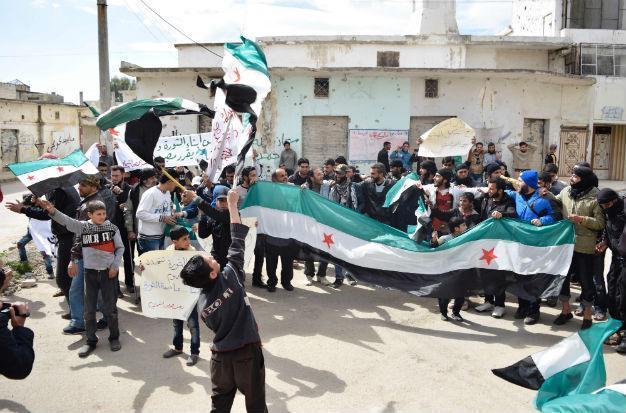No peace in Syria with Assad, West tells Putin
LONDON

AFP photo
A fragile truce in Syria must be used to try to secure a lasting peace without President Bashar al-Assad, European leaders told Russian President Vladimir Putin on March 4, according to a spokeswoman for British Prime Minister David Cameron.
Cameron, German Chancellor Angela Merkel, French President François Hollande and Italian Prime Minister Matteo Renzi told Putin in a phone call that the present cessation of hostilities must hold to try to settle a conflict that has killed more than 250,000 people and created a refugee crisis.
“The main point that the European leaders made on the call to Putin was that we welcome the fact that this fragile truce appears to be holding,” the spokeswoman told reporters, according to Reuters, on the seventh day of a cease-fire deal for the country.
“[And] we have got to use this as a positive dynamic now to create some momentum behind the talks ... so we can move from a truce into a more lasting, durable peace with a political transition away from al-Assad,” she said.
Asked how Putin had responded, the spokeswoman said there was no detailed discussion on the Syrian president.
“We all know this is one of the trickiest points,” she said, adding that Cameron “underlined the importance of a transition away from al-Assad to a government that ... can be fully representative of communities across Syria.”
“I think where we are at, for the purpose of today’s call, was to make sure that this truce can hold so that these talks can get under way in Geneva next week,” she said.
U.N. Syria envoy Staffan de Mistura plans to resume talks with the Syrian government and opposition parties on March 9. But the format for the indirect talks is flexible and some parties could turn up days later, he said.
Warplanes struck a key rebel bastion east of the Syrian capital on March 4 for the first time since a fragile truce began over the weekend, Britain-based Syrian Observatory for Human Rights said.
“Two air strikes hit the edge of the town of Douma in Eastern Ghouta and one person was killed,” Rami Abdel Rahman, head of the observatory, told AFP.
He said the strikes were conducted by either Syrian or Russian planes. It was unclear whether the individual killed was a civilian or a fighter.
The Syrian Kurdish People’s Protection Unit (YPG) said armed opposition groups in the Aleppo area had not respected a cessation of hostilities agreement, accusing them of attacking the mainly Kurdish Sheikh Maksoud district of Aleppo and other areas near the city.
A YPG report said the factions had “not abided by the cease-fire and halt to hostile operations,” according to Reuters.
“On the contrary they resumed fierce attacks and random bombardment, specifically of Sheikh Maksoud,” it said.
A major Syrian rebel group, Jaish al-Islam, has said the war had not stopped since a cessation of hostilities agreement came into effect, accusing the government of violations and saying a cease-fire was not possible while “militias and states kill our people.”
The Jaish al-Islam group is one of the biggest rebel factions fighting al-Assad in western Syria and an influential member of the main Saudi-backed opposition council, the High Negotiations Committee (HNC).
Meanwhile, Danish Prime Minister Lars Lokke Rasmussen said March 4 that Denmark would commit F-16 warplanes to the fight against the Islamic State of Iraq and the Levant (ISIL) in Syria and 400 military personnel to fight the jihadist group in Iraq.
A majority of political parties in parliament’s foreign affairs committee expressed support March 4 for the government’s proposal, and “the government will on the basis of today’s meeting submit a bill to a parliamentary vote to strengthen the campaign against ISIL,” a statement from the prime minister’s office said, according to AFP. The vote is scheduled for April 19.
For the first time in years, hundreds of Syrians nationwide took advantage of a nearly week-long cease-fire on March 4 to resume anti-government protests under the slogan “The Revolution Continues!”
Waving the three-starred tricolor flag that has become the uprising’s emblem, demonstrators in opposition-held areas of Aleppo, Damascus, Daraa and Homs called for the downfall of al-Assad’s regime.
“You could say we’ve gone back to the beginning,” said Hasaan Abu Nuh, an activist from the flashpoint rebel town of Talbisseh in central Homs province.
Syria’s conflict first began in March 2011 with widespread protests against the regime.
